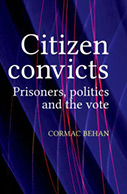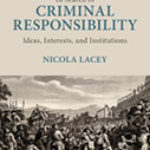Citizen Convicts: Prisoners, Politics and the Vote

Author: Cormac Behan
Publisher: Manchester, UK; New York: Manchester University Press, 2014. 214p.
Reviewer: Mary Sigler | July 2015
Cormac Behan’s Citizen Convicts undertakes to offer “the first comprehensive study of prisoners and the franchise in any jurisdiction.” (2) In many respects, the book delivers, providing a detailed account of the history and practice of prisoner political participation in the Republic of Ireland, and situating that experience in the broader international context of other Western democracies. Behan begins by reviewing the standard arguments for and against voting rights for inmates and ex-felons (i.e., convicted felons since released from prison), provides a useful canvass of disenfranchisement policy in comparative perspective, and presents the results of his original research into the views of Irish prisoner-voters regarding political participation and civic engagement. Behan concludes that the right of prisoners to vote is essential, but not itself sufficient, for democratic citizenship and legitimacy. Instead, he contends, realizing these ideals will involve “re-imagining imprisonment. It also necessitates re-conceptualizing enfranchisement, viewing it as more than just . . . enabling convicts to vote, but also as part of a deeper and wider process of engaging and empowering citizens.” (6)
Despite the value of Behan’s original contribution—a comprehensive account of the politics and practices of prisoner voting behavior and attitudes in Ireland—the book is in many ways disappointing. As an initial matter, Citizen Convicts is a bit of a slog, offering painstaking detail about the history of Irish politics, including candidate names and vote totals in elections down through the ages. To be sure, the political history of Ireland is absolutely fascinating. Particularly intriguing in the present context is the phenomenon, which Behan highlights, of ex-felons who served time for political offenses going on to become public officials with no particular interest in, or sympathy for, prison conditions or prisoner rights. But Behan does not explore the normative grounds for the distinction between “ordinary criminals” (his term) and those whose political activity landed them first in prison and later in positions of public trust. Are we (or they) justified in drawing a moral distinction between those whose criminal activity was politically motivated and those whose crimes were more conventionally self-interested and anti-social?
I don’t know the answer, but Behan’s treatment of the issue exemplifies what was for me the most serious limitation of the book. Beyond his descriptive account, Behan purports to engage the normative features of the enfranchisement controversy, arguing emphatically that democratic citizenship and democratic legitimacy require a truly universal franchise. Yet his normative arguments generally spring from a number of undefended assumptions that reflect little engagement with the core liberal-democratic concepts of citizenship, community, and punishment. In fairness to Behan, the debate over disenfranchisement is not very well developed in either the political discourse or the scholarly literature. Indeed, judging by legal scholarship in the United States, the debate is decidedly one-sided against disenfranchisement. Still, it strikes me that this should make Behan’s job—building a case for enfranchisement—harder, not easier. I wish he would have articulated the positions he defends and rejects with greater nuance and imagination.
Behan gets off to a promising start, noting that the issue of prisoner (and ex-felon) enfranchisement lies “at the intersection of punishment and representative government.” (2) Thus, the “debate about prisoner enfranchisement is significant because it gives us some insights into the objectives of imprisonment, society’s conflicted attitude towards prisoners, the nature of democracy and the concept of citizenship.” (2) In addition, Behan acknowledges here and there the importance of social, political, and cultural context, though he rarely explores the implications of these variations for the policies he advocates. Instead, he seems focused on what is realistic or possible, rather than what is normatively attractive in light of a particular polity’s distinctive values.
Perhaps my frustration with Behan’s pragmatic approach reflects a disciplinary bias against descriptive social science. But Behan also advances a number of normative positions, and, from the outset, some of his rhetorical flourishes expose his inclination to see even empirical matters a particular way. Early on, for example, he laments that strict disenfranchisement policies in the United States “have removed millions [of African-American men] from the voting register, tearing at the fabric of minority communities and casting doubt on the US desire to be seen as a beacon of liberal democracy.” (5) Despite the factual accuracy of Behan’s observation about the disparate racial impact of disenfranchisement policies in the United States, his vivid characterization of the consequences is dubious and implausible. Among the very real threats to the “fabric of minority communities” in the US, a lack of voting rights for ex-felons is probably not high on the list. In fact, voter participation in minority communities is notoriously low even among those whose voting rights remain intact. Under these circumstances, it’s hard to credit the causal story that ex-felon disenfranchisement explains the plight of minority communities. Moreover, one supposes that if liberal democracy in the United States is called into question, it will have more to do with the staggering disparities in the incarceration rates of African Americans than with the collateral consequence of disenfranchisement.
Similarly unconvincing are Behan’s sanguine hopes for prisoner participation. According to Behan:
By voting, participating in civic society and engaging in public discourse, prisoners may generate a more holistic understanding of the prison system. Their insights might inform discussions about prison conditions, prisoners’ rights and penal reform. Prisoner experiences could contribute to deliberations on the place of prison in the matrix of punishment and an understanding of the wider criminal justice system. (184)
Maybe. But having cast serious doubt—appropriately—on the dire predictions of those who oppose prisoner enfranchisement, Behan might do well to curb his own enthusiasm. For the opponents’ unfounded claim that prisoners and ex-felons would engage in voter fraud or otherwise corrupt the ballot box seems only slightly less plausible than Behan’s hope that prisoners will have a transformational civic impact. As Behan himself documents, ex-inmates are not necessarily keen to identify with their incarcerated past, and, in most jurisdictions, they are among the least likely citizens to exercise their right to vote.
Compounding these rhetorical excesses, Behan does little to establish the grounds for the conception of liberal-democracy that informs his case for a universal franchise. This would require critical engagement with alternative accounts, something almost completely absent from his discussion. Although he rehearses the most familiar arguments in favor of disenfranchisement—including social contract theory and various republican arguments—he promptly settles on the predictable and rhetorically pleasing approach that guarantees full citizenship and equality for all. Left unexplored is the range of meaning these concepts might bear in a defensible account of liberal democracy.
Consider, first, the commitment to equal citizenship. Although one’s status as a citizen is generally thought to entail moral equality, this need not require equal or identical treatment in every instance. Instead, equality is generally conceptualized in terms of equal treatment for those similarly situated. With respect to criminal offenders, for example, punishment is generally justified based on individual acts of criminal wrongdoing. Thus, imprisoning some but not others in a liberal-democratic polity does not offend the equality principle if the punitive treatment is based on relevant moral differences—especially culpable law violation—that distinguish offenders from non-offenders. Although imprisoning some citizens (but not others) may violate some facile notion of equality, it does not offend the moral equality at the heart of liberal-democratic citizenship.
Note that this brief analysis does not tell us whether prisoner disenfranchisement violates the equality principle. Instead, it suggests the complexity of the question and the kind of normative inquiry needed to answer it. In particular, a defensible disenfranchisement policy requires a judgment about whether inmates and ex-felons are similarly situated in the relevant moral sense. Alas, Behan, who does not seem to object to the practice of denying inmates their personal liberty, provides no argument to show that denying them the franchise threatens equal citizenship in a way that incarceration itself does not. It may be reasonable in a liberal-democratic context to place the burden of persuasion on those who would deny voting rights, but it won’t do to declare in advance, as Behan does, that a commitment to equal citizenship entails a universal franchise.
Behan’s discussion of “community” is similarly unsatisfying. Despite a well-developed literature that grapples with the age-old right of political communities to define themselves, Behan summarily dismisses the idea: “Society cannot go back to a time when an elite decided who should be the electorate. Voting is a fundamental right of every citizen, not a privilege to be dispensed by the powerful.” (22) Now one can share Behan’s disdain for the idea that the powerful elite should get to decide who votes, but I don’t actually know of anyone seriously making that argument. The difficult question is whether, and on what basis, a political community can set its membership in terms of the values and expectations, rights and responsibilities of citizenship. Reasonable people (and peoples) can disagree about how a polity defines the electorate, but some well-established exceptions to a universal franchise—for children, the mentally unstable, and noncitizen residents—suggest that populist bromides will not settle the matter.
Behan also gives short shrift to the place and purpose of punishment in the disenfranchisement debate. In the United States, the disenfranchisement of felons (and ex-felons) is formally regulatory, not punitive, though Behan never addresses the distinction in his frequent references to US electoral policy. This oversight is unfortunate because it narrows the possibilities for conceptualizing the suspension of voting rights as an affirmation, rather than a betrayal, of democratic citizenship. In particular, the punitive model cannot accommodate the possibility that while criminal offenders deserve punishment for breaking the law, only citizen offenders are liable to disenfranchisement for violating civic trust.
In any case, despite Behan’s (implicit) assumption that disenfranchisement is punitive, he has little to say about the justification of punishment apart from occasional references to deterrence and rehabilitation. Missing altogether is any meaningful consideration of the criminal law’s condemnatory function. Indeed, Behan deplores the “stigma of incarceration” (187) and the “threat to the prisoners’ self-image” (194) associated with the prison experience. “Prison,” he observes, “seemed to engender compliance, where individuals do not act or do as they felt.” (173)
These are curious criticisms to level from a purportedly liberal-democratic vantage point. As an initial matter, the exclusive focus on punishment as manipulation (deterrence) or treatment (rehabilitation) is hard to reconcile with the deontological commitments of modern liberalism. For despite Behan’s concern for the dignity and autonomy of offenders, he does not acknowledge that respecting the moral agency of offenders is generally thought to require calling them to account for their misdeeds. Thus, a serious criminal offender who does not experience punishment as a blow to his self-image has missed the punitive point. Moreover, given the alternatives, engendering law compliance seems like a pretty good punitive outcome.
On the whole, Behan deserves credit for broadening the discussion of prisoner enfranchisement to focus on the interplay between punishment and citizenship. He reminds us that it’s possible both to overrate and undervalue the right to vote. But in spite of (or because of?) his obvious passion for the subject, he ultimately fails to capture—or even engage—the moral imagination. Citizen Convicts veers between the overly detailed and the overly dogmatic, leaving little space for a proper defense of Behan’s good intentions.
Mary Sigler, Associate Dean & Professor of Law, Sandra Day O’Connor College of Law, Arizona State University


